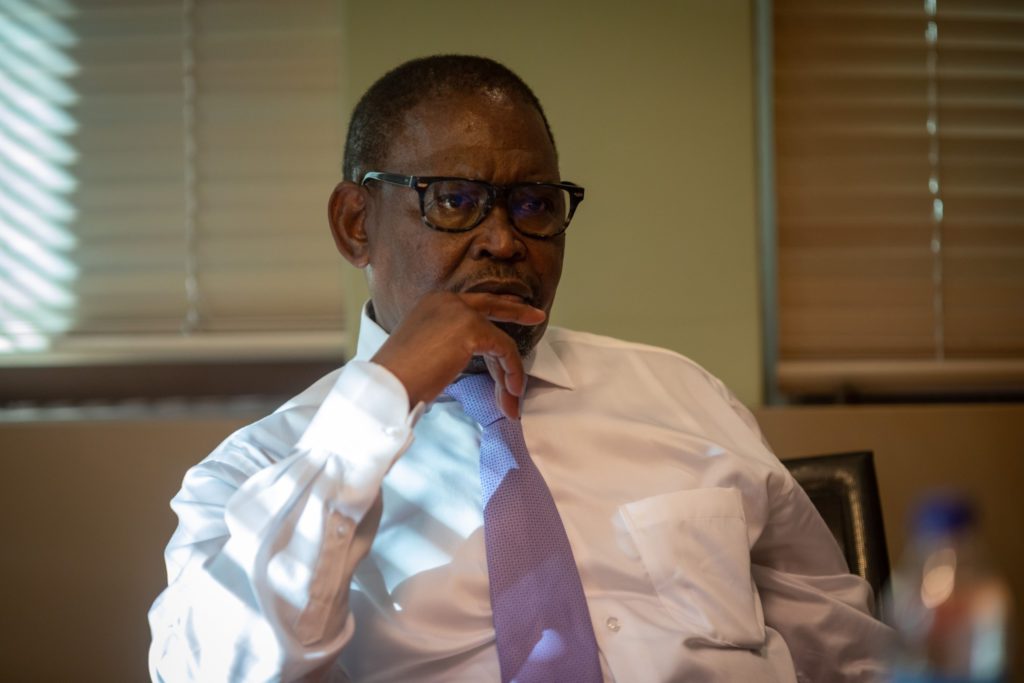(Bloomberg) — South Africa cut corporate taxes and set more ambitious targets for reducing debt, after a surge in commodity prices led to higher-than-expected tax income.
Finance Minister Enoch Godongwana announced a 1 percentage point reduction in the company tax rate to 27% from April and stuck to pledges to rein in pay for civil servants and limit bailouts for state companies.
He also delivered inflation-linked tax relief for individuals and kept fuel levies steady for the first time in more than three decades, while allocating funds to extend monthly stipends for the jobless.
“We committed ourselves to charting a course towards growth and fiscal sustainability. This budget reasserts this commitment,” Godongwana said in a copy of his inaugural annual budget speech.
“It also extends income and employment support to the most vulnerable, addresses service delivery shortcomings and provides tax relief. However, these interventions cannot replace the structural changes our economy needs.”
The tax breaks, together with enhanced incentives to encourage firms to hire legions of unemployed youth, come four months after a municipal vote in which support for the ruling African National Congress dropped below 50% for the first time since it took power in 1994.
While the pro-business measures and the government’s insistence that it needs to reduce its wage bill may anger labor unions, an expansion of the social security net and more job opportunities should shore up support for the party ahead of national elections in 2024.
Policy Shift
In his state-of-the-nation address two weeks ago, President Cyril Ramaphosa stressed that job creation must be led by the private sector and that the government must provide an enabling business environment.
That’s a shift from a long-held view among some in the ANC that the state should play a bigger role in the economy and could signal that the president’s grip over the deeply divided party is strengthening in the run-up to a party conference in December, where he is expected to seek re-election as its leader.
The National Treasury allocated 44 billion rand ($2.9 billion) to fund the one-year extension of a 350-rand monthly jobless stipend that was first introduced in 2020 to cushion them from the fallout of the pandemic.
With almost half the population of 60 million already receiving state pay-outs, a debate continues to rage in South Africa over whether the government should continue bolstering welfare spending and introduce a permanent income grant.
“In the absence of higher economic growth that supports long-term improvements in revenue collection, any proposals to fund permanent additions to public expenditure require careful scrutiny,” the Treasury said.
A 50 billion-rand increase in annual spending would need to be funded by a 2 percentage-point increase in personal-income tax rates or a similar increase in the value-added tax rate, it said.
The budget projects that the economy will grow by an average of 1.8% over the next three years, well short of what is needed to make a meaningful dent in the 35% unemployment rate.
Revenue Windfall
The revenue windfall, largely due to high commodity prices, for the current fiscal year is seen at 182 billion rand and is 50% higher than the government’s November estimate.
Tax collections are expected to remain buoyant, enabling the Treasury to allocate 211.6 billion rand between the 2022 and 2024 fiscal years to reduce the budget gap and borrowing requirements.
“When I took the job in August, I was a bit scared,” Godongwana told reporters.
“Now I’m not scared, I think we are turning the corner. We’ve got hope.”
Debt will probably peak at 75.1% of GDP in the 2025 fiscal year, 12 months sooner and 3 percentage points lower than was predicted in November.
The budget shortfall is expected to drop to 4.2% of GDP in fiscal 2025, from 5.7% this year.
A primary budget surplus, where revenue exceeds non-interest spending, of 3.2 billion rand is seen by 2024, a year earlier than expected.
That will bring multi-year fiscal consolidation efforts to a close and allow the government to “reconsider the funding of South Africa’s priorities” in a more stable environment, the Treasury said.
The government plans to introduce a new, more robust fiscal anchor in the next three years.
While several options will be considered over the next year, it could bow to the International Monetary Fund’s repeated calls for a debt ceiling — a move both former Finance Minister Tito Mboweni and South African Reserve Bank Governor Lesetja Kganyago committed to consider when seeking emergency Covid-19 aid from the lender in 2020.











